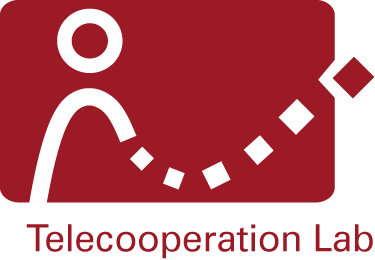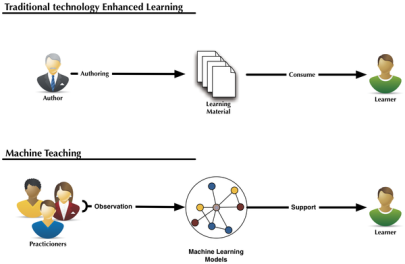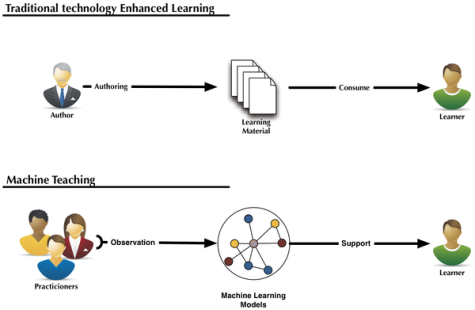Problem definition
Many applications of Technology Enhanced Learning are based on strong assumptions: Knowledge needs to be standardized, structured and most of all externalized into learning material that preferably is annotated with meta-data for efficient re-use. A vast body of valuable knowledge does not meet these assumptions, including informal knowledge such as experience and intuition that is key to many complex activities.
Proposed solution
We notice that knowledge, even if not standardized, structured and externalized, can still be observed through its application. We refer to this observable knowledge as Practiced Knowledge. We propose a novel approach to Technology Enhanced Learning named Machine Teaching to convey this knowledge: Machine Learning techniques are used to extract machine models of Practiced Knowledge from observational data. These models are then applied in the learner's context for his support.
We identify two important subclasses of machine teaching, General and Detailed Feedback Machine Teaching. General Feedback Machine Teaching aims to provide the learner with a "grade-like'' numerical rating of his work. This is a direct application of supervised machine learning approaches. Detailed Feedback Machine Teaching aims to provide the learner with in-depth support with respect to his activities. An analysis showed that a large subclass of Detailed Feedback Machine Teaching applications can be addressed through adapted recommender systems technology.
The ability of the underlying machine learning techniques to capture structure and patterns in the observational data is crucial to the overall applicability of Machine Teaching. Therefore, we study the feasibility of Machine Teaching from a machine learning perspective.
Following this goal, we evaluate the General Feedback Machine Teaching approach using state-of-the-art machine learning techniques: The exemplary Machine Teaching system is sought to provide the learner with quality estimations of his writing as judged by an online community. The results obtained in this evaluation are supportive of the applicability of Machine Teaching to this domain.
To facilitate Detailed Feedback Machine Teaching, we present a novel matrix factorization model and algorithm. In addition to addressing the needs of Machine Teaching, it is also a contribution to the recommender systems field as it facilitates ranking estimation. An Evaluation in a Detailed Feedback Machine Teaching scenario for software engineers supports the feasibility of Machine Teaching in that domain.
Conclusions
We therefore conclude that machine learning models capable of capturing important aspects of practiced knowledge can be found in both, General and Detailed Feedback Machine Teaching. Machine Teaching does not assume the knowledge to be externalized, but to be observable and therefore adds another body of knowledge to Technology Enhanced Learning not amenable to traditional Technology Enhanced Learning approaches.
People
Former Project Member
- Markus Weimer
Contact
- Prof. Dr. Max Mühlhäuser





